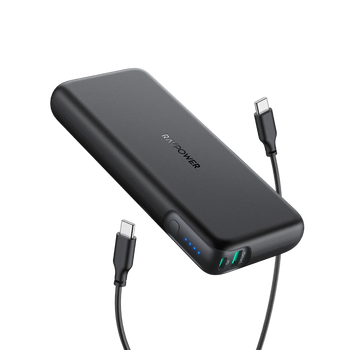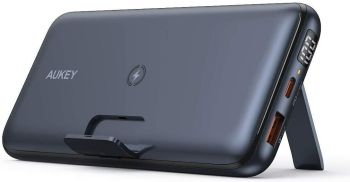When it comes to portable power solutions, two popular options stand out among the rest: the RAVPower PD Pioneer 20000mAh 60W and the Aukey Basix Pro 20000mAh. Both of these usb-c power banks boast impressive capacities and feature sets, but they also have some key differences that set them apart.
First, let's take a look at the capacity of both devices. As their names suggest, both the RAVPower PD Pioneer and the Aukey Basix Pro have 20,000mAh batteries, which is more than enough to charge most smartphones several times over. However, it's worth noting that the actual capacity may vary depending on the device being charged and the efficiency of the power bank itself.
One area where the RAVPower PD Pioneer excels is in its charging capabilities. With a maximum output of 60W via USB-C Power Delivery (PD), this power bank can quickly charge larger devices like laptops and tablets, making it an excellent choice for heavy users who need to stay productive on the go. In contrast, the Aukey Basix Pro has a more modest maximum output of 18W, which is still sufficient for charging smartphones and smaller devices, but may not be enough for larger devices.
Another key difference between the two power banks is their port selection. The RAVPower PD Pioneer features two USB-A ports, one USB-C port, and a micro-USB input, providing a wide range of options for charging different devices. The Aukey Basix Pro, on the other hand, has three USB-A ports and a micro-USB input, but lacks a dedicated USB-C port. While this may not be a deal-breaker for some users, it's worth considering if you have devices that rely on USB-C for charging.
In terms of design and build quality, both power banks are well-constructed and feel solid in the hand. The RAVPower PD Pioneer has a slightly more premium feel, with a textured surface and a compact design that makes it easy to slip into a pocket or bag. The Aukey Basix Pro, on the other hand, has a more utilitarian design, but is still durable and easy to carry around.
Finally, let's talk about price. The RAVPower PD Pioneer tends to be slightly more expensive than the Aukey Basix Pro, which may be a consideration for budget-conscious buyers. However, given its more advanced features and faster charging capabilities, the RAVPower PD Pioneer may be worth the extra cost for users who need a high-performance usb-c power bank.
In conclusion, both the RAVPower PD Pioneer 20000mAh 60W and the Aukey Basix Pro 20000mAh are excellent options for anyone in the market for a reliable and powerful usb-c power bank. While they share some similarities, their differences in charging capabilities, port selection, and design make them suited to different types of users. If you need a high-performance power bank that can charge larger devices quickly, the RAVPower PD Pioneer may be the better choice. However, if you're looking for a more affordable option with plenty of capacity and multiple USB-A ports, the Aukey Basix Pro is definitely worth considering.































